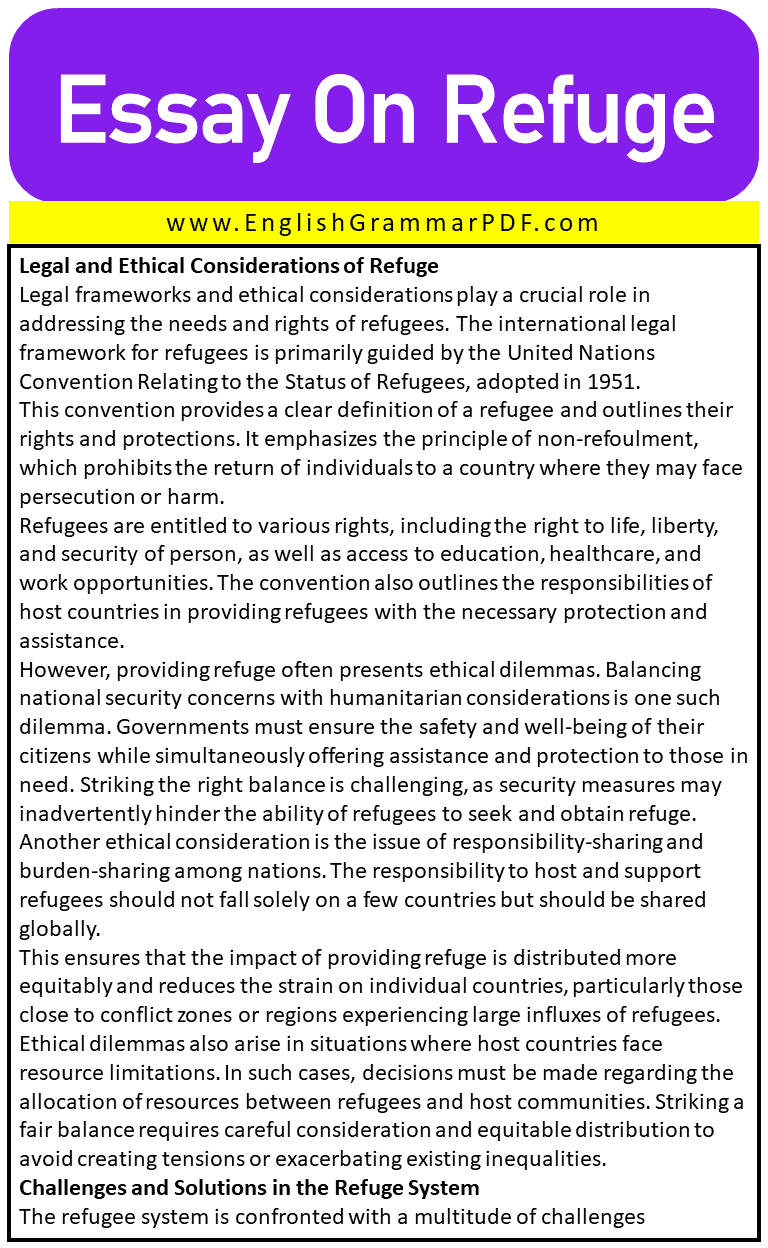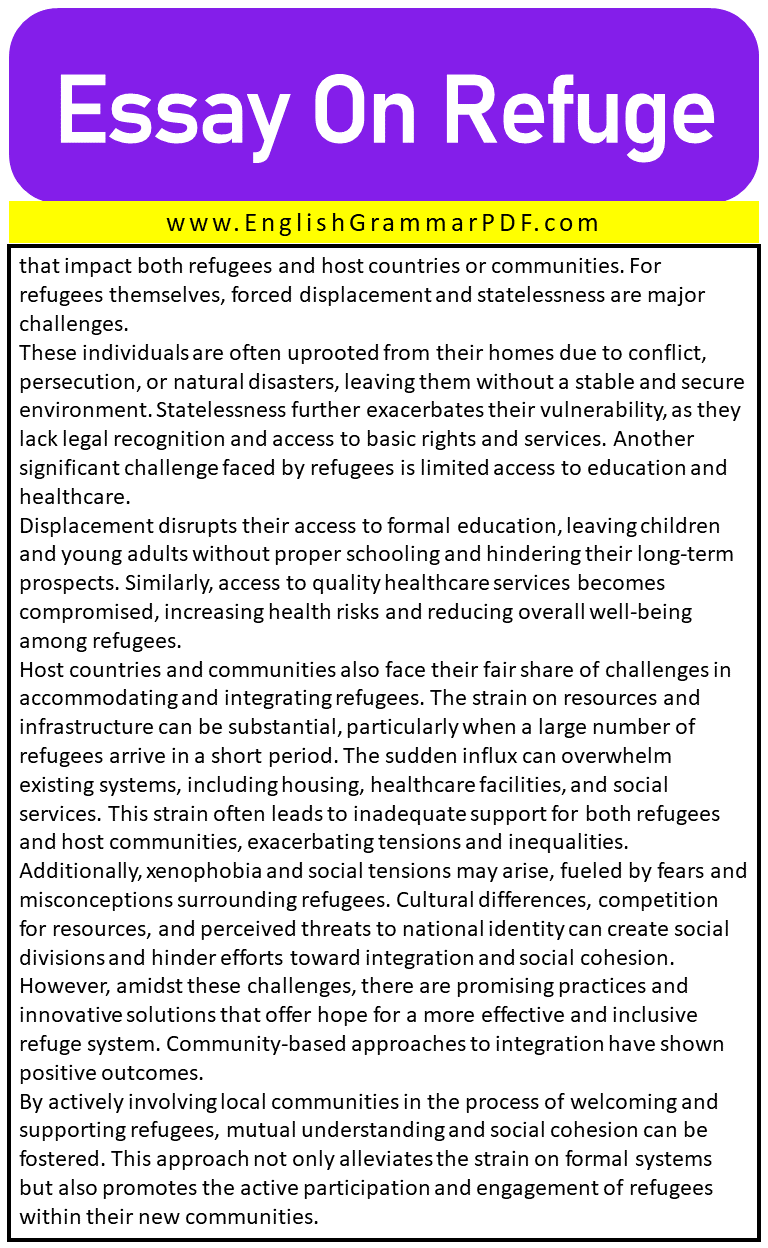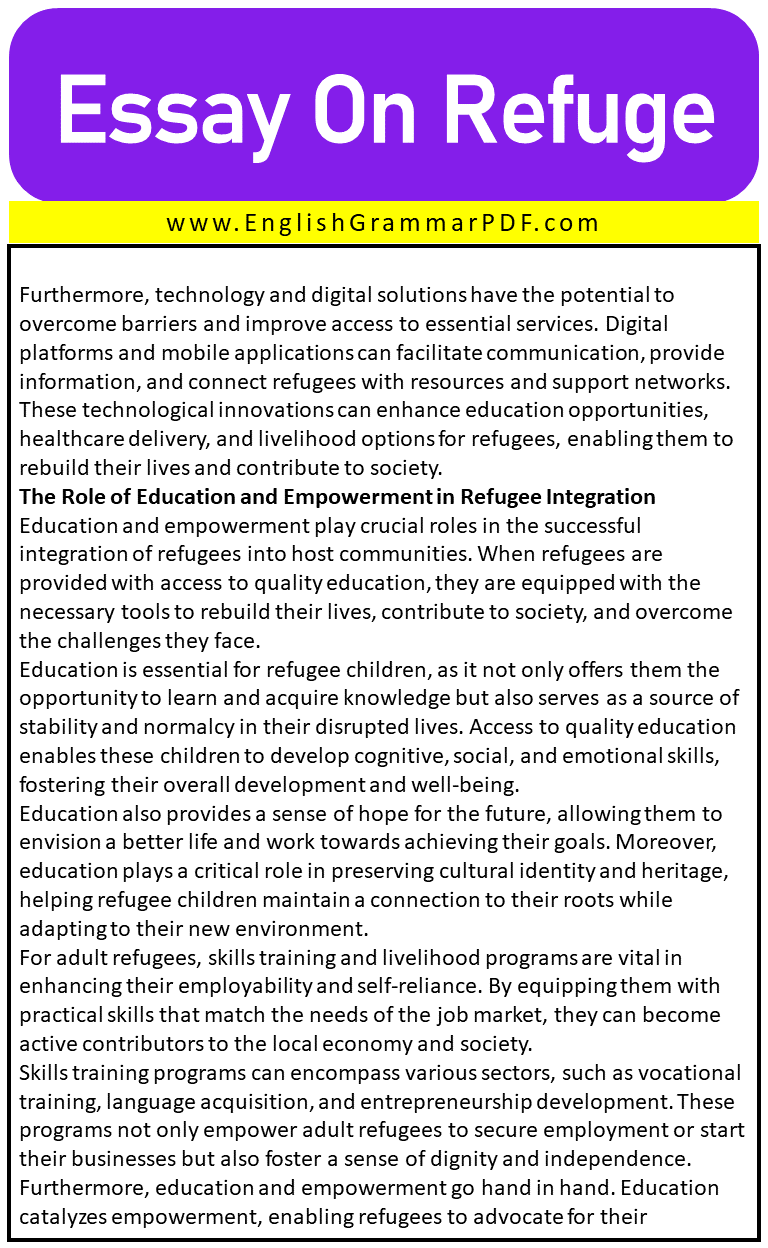Essay On Refuge
Outline of Essay:
- Introduction
- Historical Perspective on Refuge
- The Significance of Refuge in Modern Society
- Legal and Ethical Considerations of Refuge
- Challenges and Solutions in the Refuge System
- The Role of Education and Empowerment in Refugee Integration
Introduction
Refuge, a term deeply rooted in human history, refers to a place of safety, protection, and sanctuary sought by individuals fleeing persecution, violence, or disaster. Understanding the concept of refuge is of utmost importance in comprehending the challenges and opportunities faced by both refugees and host communities. This essay aims to explore the multifaceted dimensions of refuge, examining its historical origins, significance in modern society, legal and ethical considerations, challenges and solutions within the refuge system, the role of education and empowerment in refugee integration, and case studies highlighting successful models. By delving into these aspects, we can gain a deeper understanding of the complex issues surrounding refuge and foster a more inclusive and compassionate world.
Historical Perspective on Refuge
The refuge has existed since ancient times, manifesting in various forms throughout history. Ancient civilizations, such as the Greeks and Romans, established sanctuaries where individuals seeking protection could find solace. Similarly, religious and spiritual institutions often served as refuges, providing safety and shelter for those facing persecution or seeking spiritual guidance.
Furthermore, political and social refugees emerged, such as the Underground Railroad during the era of slavery, offering escape routes to freedom. These historical examples demonstrate the enduring need for refuge and the human instinct to seek safety and protection.
The Significance of Refuge in Modern Society
Refugees hold immense significance in modern society, particularly as a response to humanitarian crises. In times of conflict, persecution, or natural disasters, individuals and families often seek refuge as a means of survival and protection.
Refugee camps and settlements are established to provide temporary shelter, necessities, and medical assistance to those displaced from their homes. These safe havens offer a lifeline to refugees, enabling them to rebuild their lives and regain a sense of security.
International organizations and governments play a crucial role in responding to refugee crises. They provide humanitarian aid, resources, and expertise to support the establishment and maintenance of refugee camps and settlements.
These organizations collaborate with host countries, coordinating efforts to ensure the well-being and protection of refugees. Moreover, governments work alongside international bodies to develop legal frameworks that govern the rights and responsibilities of both refugees and host communities.
The act of seeking refuge itself brings forth significant psychological and emotional aspects. Refugees often endure traumatic experiences, having witnessed violence, lost loved ones, and faced extreme hardships. The impact of trauma can be long-lasting, resulting in mental health issues such as post-traumatic stress disorder (PTSD), anxiety, and depression.
However, refugees demonstrate remarkable resilience, finding ways to cope with their circumstances. Through the support of their communities, social networks, and cultural practices, they tap into inner strength and adaptability to navigate the challenges they face.
From an economic perspective, refuge presents both challenges and opportunities for host countries. The influx of refugees places a strain on resources and infrastructure, requiring significant investments to accommodate their basic needs.
However, hosting refugees can also bring economic benefits. Refugees contribute to local economies through their skills, entrepreneurship, and labor force participation. When provided with opportunities for education and employment, refugees can become agents of economic growth, fostering integration and social cohesion within their host communities.
Legal and Ethical Considerations of Refuge
Legal frameworks and ethical considerations play a crucial role in addressing the needs and rights of refugees. The international legal framework for refugees is primarily guided by the United Nations Convention Relating to the Status of Refugees, adopted in 1951.
This convention provides a clear definition of a refugee and outlines their rights and protections. It emphasizes the principle of non-refoulment, which prohibits the return of individuals to a country where they may face persecution or harm.
Refugees are entitled to various rights, including the right to life, liberty, and security of person, as well as access to education, healthcare, and work opportunities. The convention also outlines the responsibilities of host countries in providing refugees with the necessary protection and assistance.
However, providing refuge often presents ethical dilemmas. Balancing national security concerns with humanitarian considerations is one such dilemma. Governments must ensure the safety and well-being of their citizens while simultaneously offering assistance and protection to those in need. Striking the right balance is challenging, as security measures may inadvertently hinder the ability of refugees to seek and obtain refuge.
Another ethical consideration is the issue of responsibility-sharing and burden-sharing among nations. The responsibility to host and support refugees should not fall solely on a few countries but should be shared globally.
This ensures that the impact of providing refuge is distributed more equitably and reduces the strain on individual countries, particularly those close to conflict zones or regions experiencing large influxes of refugees.
Ethical dilemmas also arise in situations where host countries face resource limitations. In such cases, decisions must be made regarding the allocation of resources between refugees and host communities. Striking a fair balance requires careful consideration and equitable distribution to avoid creating tensions or exacerbating existing inequalities.
Challenges and Solutions in the Refuge System
The refugee system is confronted with a multitude of challenges that impact both refugees and host countries or communities. For refugees themselves, forced displacement and statelessness are major challenges.
These individuals are often uprooted from their homes due to conflict, persecution, or natural disasters, leaving them without a stable and secure environment. Statelessness further exacerbates their vulnerability, as they lack legal recognition and access to basic rights and services. Another significant challenge faced by refugees is limited access to education and healthcare.
Displacement disrupts their access to formal education, leaving children and young adults without proper schooling and hindering their long-term prospects. Similarly, access to quality healthcare services becomes compromised, increasing health risks and reducing overall well-being among refugees.
Host countries and communities also face their fair share of challenges in accommodating and integrating refugees. The strain on resources and infrastructure can be substantial, particularly when a large number of refugees arrive in a short period. The sudden influx can overwhelm existing systems, including housing, healthcare facilities, and social services. This strain often leads to inadequate support for both refugees and host communities, exacerbating tensions and inequalities.
Additionally, xenophobia and social tensions may arise, fueled by fears and misconceptions surrounding refugees. Cultural differences, competition for resources, and perceived threats to national identity can create social divisions and hinder efforts toward integration and social cohesion.
However, amidst these challenges, there are promising practices and innovative solutions that offer hope for a more effective and inclusive refuge system. Community-based approaches to integration have shown positive outcomes.
By actively involving local communities in the process of welcoming and supporting refugees, mutual understanding and social cohesion can be fostered. This approach not only alleviates the strain on formal systems but also promotes the active participation and engagement of refugees within their new communities.
Furthermore, technology and digital solutions have the potential to overcome barriers and improve access to essential services. Digital platforms and mobile applications can facilitate communication, provide information, and connect refugees with resources and support networks. These technological innovations can enhance education opportunities, healthcare delivery, and livelihood options for refugees, enabling them to rebuild their lives and contribute to society.
The Role of Education and Empowerment in Refugee Integration
Education and empowerment play crucial roles in the successful integration of refugees into host communities. When refugees are provided with access to quality education, they are equipped with the necessary tools to rebuild their lives, contribute to society, and overcome the challenges they face.
Education is essential for refugee children, as it not only offers them the opportunity to learn and acquire knowledge but also serves as a source of stability and normalcy in their disrupted lives. Access to quality education enables these children to develop cognitive, social, and emotional skills, fostering their overall development and well-being.
Education also provides a sense of hope for the future, allowing them to envision a better life and work towards achieving their goals. Moreover, education plays a critical role in preserving cultural identity and heritage, helping refugee children maintain a connection to their roots while adapting to their new environment.
For adult refugees, skills training and livelihood programs are vital in enhancing their employability and self-reliance. By equipping them with practical skills that match the needs of the job market, they can become active contributors to the local economy and society.
Skills training programs can encompass various sectors, such as vocational training, language acquisition, and entrepreneurship development. These programs not only empower adult refugees to secure employment or start their businesses but also foster a sense of dignity and independence.
Furthermore, education and empowerment go hand in hand. Education catalyzes empowerment, enabling refugees to advocate for their rights, make informed decisions, and actively participate in their host communities.
Empowered refugees are more likely to engage in civic activities, bridge cultural gaps, and build positive relationships with their new neighbors. By promoting education and empowerment, host communities can create inclusive environments that embrace diversity, fostering social cohesion and mutual understanding.
FAQ’s
How can we help refugees?
By providing humanitarian aid, supporting organizations that assist refugees, advocating for their rights, promoting inclusive policies, and offering opportunities for education, employment, and integration.
What is the main message of refuge?
The main message of refuge is to provide safety, protection, and sanctuary for individuals who are fleeing persecution, violence, or disaster, ensuring their basic human rights and dignity are upheld.
Explore More Essays:
Download the PDF of the Essay:









